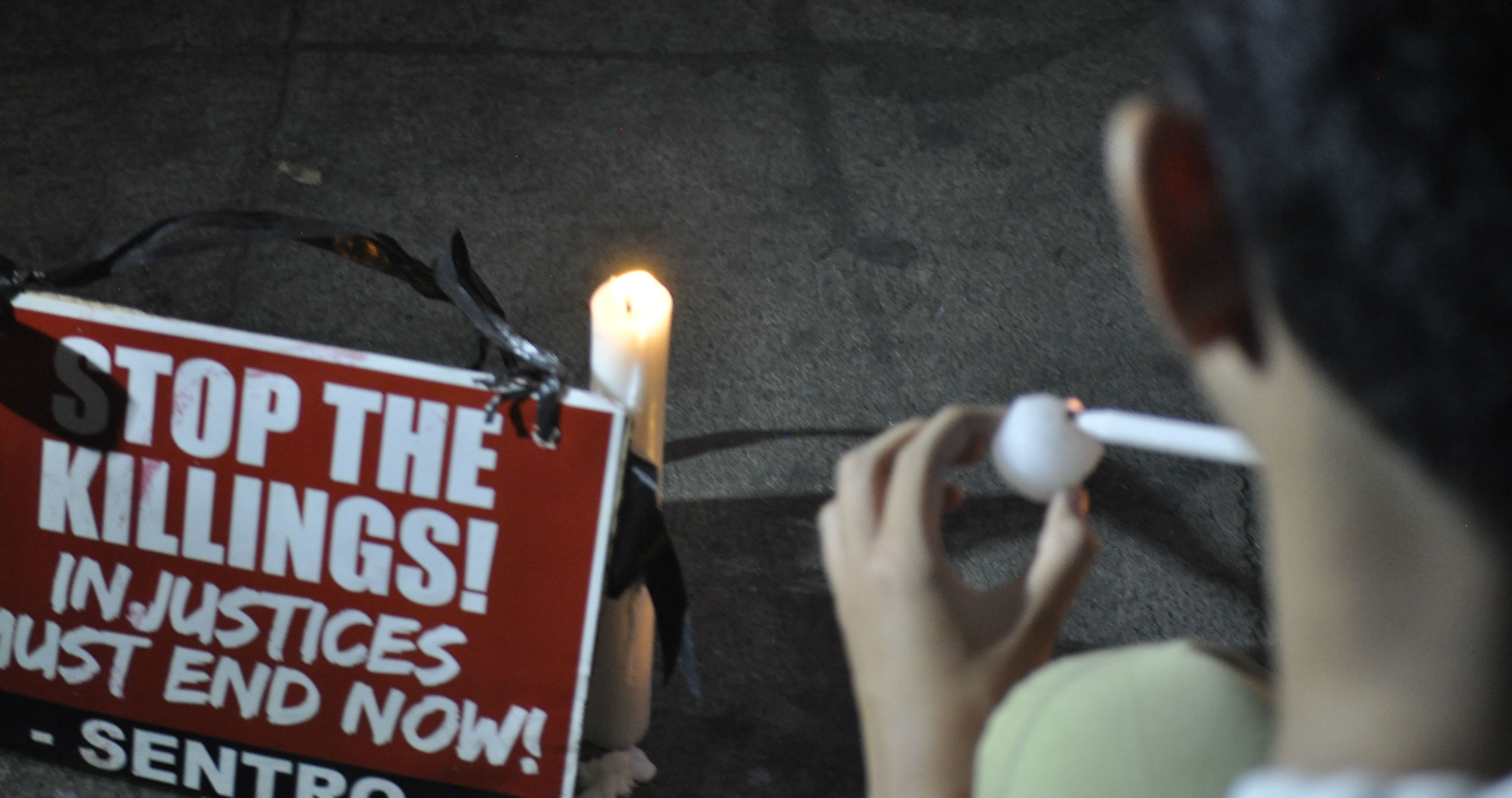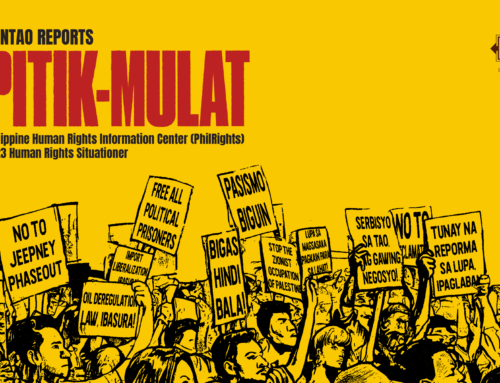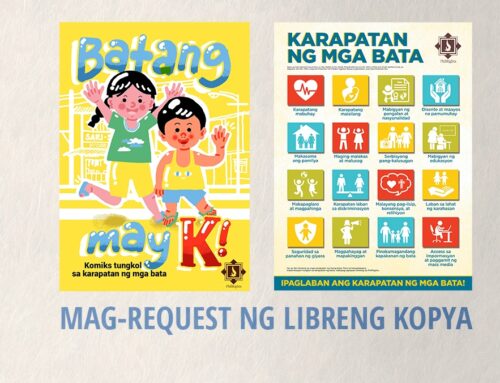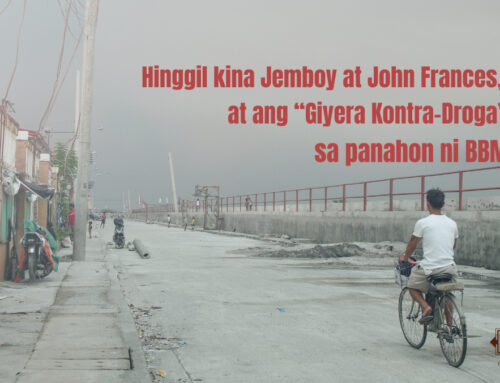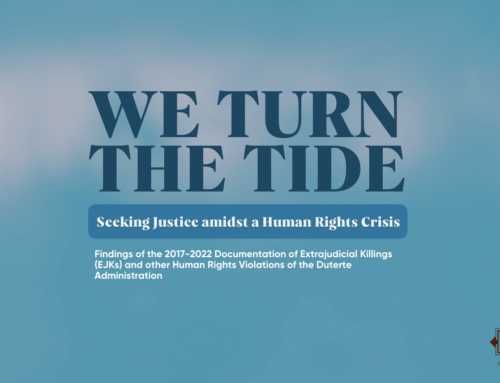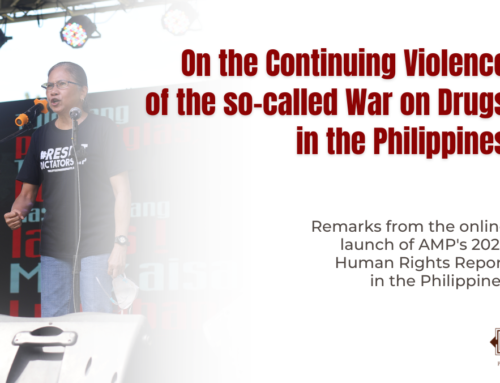By Aristotle Villaroman
November 20 is known as Universal Children’s Day . This occasion commemorates the 1989 adoption of the Convention on the Rights of the Child , the basic international law on Children’s Rights, by the United Nations General Assembly. It is also about the recognition of the achievements done in the arena of Children’s Rights, the changes in the lives of children across the world according to international standards of decent living for young people.
However, this appreciation of milestones must also be met with the recognition of the challenges in fulfilling and protecting the rights of children. Furthermore, enumerating Children’s current issues require a broad scanning of the general Human Rights situation of the country. Our current situation provides the best and worst of times for Human Rights defense in the country, including the protection and promotion of Children’s Rights.
Our Human Rights at risk
The candidacy of then-Mayor Rodrigo Duterte as the 16th President of the Republic of the Philippines, known for his tough stance against criminality when he was still a mayor of the southern city of Davao, resonated effectively among the populace whose frustrations with the problems of the country led to a desire for a ‘strong’ kind of leadership. The election victory of President Duterte would later lead to a brutal war not just against illegal drugs but also against Human Rights itself.
‘Criminals are not humans, therefore they do not have human rights.’ This is how the current administration justifies its brutal and bloody campaign against criminality and the illegal drugs problem. Basic Human Rights concepts and principles have been viciously distorted and its advocates have been vilified to pave the way for the implementation of authoritarian and draconian policies that endanger the freedoms and dignities of every Filipino. The constellation of human rights issues that have emerged because of these policies can be briefly summed up as below:
- The president’s exhortation to the public to kill criminals, which has resulted in the ‘cheapening’ of human life and the normalization of violence;
- The surge in the cases of killings under the so-called war on drugs, resulting in thousands of deaths, with most of the victims – merely suspected as drug users and pushers – killed during police operations or killed by unidentified assassins;
- Proclamation of Martial Law in Mindanao in the context of terrorism in Marawi City, resulting in more than 300,000 residents internally displaced and paving the way for the rise of violations against the population of Mindanao and the climate of fear around the country;
- The aggressive push for the restoration of the Death Penalty, in violation of the 1987 Constitution and international human rights commitments;
- The lack of respect towards marginalized and vulnerable sectors (women, persons with disabilities, LGBT+) through the president’s public pronouncements (e.g., repeated jokes about rape);
- Verbal and online assaults against Human Rights Defenders, attempting to silence them by threats from the President himself and from his supporters, or by an army of online trolls who use the cyberspace to bully individuals and organizations speaking out against Human Rights violations; and
- Disregard for the rule of law and the prevalence of a culture of impunity, undermining the decades of reform done to strengthen government institutions to promote and uphold Human Rights.
Children are not spared
President Duterte himself has led the attack against children, alleging that pro-children policies have only resulted in producing “a generation of criminals.”
The weakening of Human Rights institutions has also put Filipino children at a more vulnerable position for attacks on their basic rights. President Duterte himself has led the attack against children, alleging that pro-children policies have only resulted in producing “a generation of criminals.” Among the anti-child policies of the Duterte administration are the following:
- Denial of Right to Life: According to the Children’s Legal Rights & Development Center (CLRD), there have been 60 documented cases of children killed in the implementation of the war on drugs, either as ‘collateral damage’ (the way authorities dismiss these deaths) or as specific targets of the killings;
- Denial of Rights to Liberty and Movement:
-
- The latest data show a total of 26,415 children who ‘surrendered’ under ‘Oplan Tokhang’ (the flagship anti-illegal drugs program of the Duterte administration) as either drug users or couriers/runners. The house-to-house visits by the police, with some groups using coercion in urban poor communities, have forced families to yield to the pressure and share information about their children who are or have been involved in drugs. These thousands of children who surrendered, with no concrete programs for their rehabilitation available, are now subjected to intensive surveillance and are under constant threat of incarceration or worse, of being killed;
- There are 407 children currently incarcerated in regular jails; 125 of them have alleged drug-related offenses. The national law requiring separate jails for adults and minors has not been properly implemented nationwide, ignoring the repeated calls of children’s rights organizations that placing children among adult inmates decreases their chances of successful rehabilitation;
- The administration has been advocating for policies that contravene important provisions and the intent of the UN Convention on the Rights of the Child, such as the lowering of the minimum age of criminal responsibility (MACR) from 15 to 9 years old, and the implementation of a nationwide curfew for minors;
- Denial of Economic, Social and Cultural Rights of Children:
- There is a marked increase in the number of children orphaned or without adequate adult care due to the death and/or incarceration of one or both parents (mostly fathers) who were suspected drug users and/or pushers. It would be difficult to put an exact number of orphans and children without adult care, but the number could be in the tens of thousands. These children are at risk of being denied protection, proper family care and the right to development. Without families, these children could end up in the streets or become victims of trafficking.
- The orphaned children, widows and surviving members of the victims of EJK are ostracized by their own communities, who consider them as social pariahs. This treatment creates a culture of stigmatization and division in communities, further disempowers the victims, and compounds the deprivation and denial of rights (e.g., a child who stops going to school, a widowed mother who cannot earn a livelihood).
- The obsession of the government to reduce the number of drug users has led to the implementation of mandatory drug testing in schools and communities, exposing those who have been tested (children and adults alike), whether actual drug users or not, to the possibility of stigmatization by their peers, or worse, being a target for killing; and
- The anti-poor economic policies of this administration, such as the failure to end labor contractualization, the lack of employment programs, the regressive and anti-poor tax ‘reform,’ and the onerous bilateral loans for infrastructure programs from China, are basically the repetition of policies that have mired the Filipinos in vicious cycles of poverty for decades. Such repetition of disastrous policies will further deprive poor families of the chance to improve the quality of their lives and create a better future for their children.
These ongoing attacks on the freedoms and dignities of the Filipino people create a general atmosphere of fear, impunity, absence of respect for rights including Children’s Rights, and normalization of violence. Such conditions will influence the development of today’s children, possibly creating a generation totally ignorant of and even antagonistic towards Human Rights values.

But the most important element of any Children’s Rights advocacy is the involvement of children themselves.
A Call for Action
This enumeration of the Human Rights and Children’s Rights problems brought to the fore by the actions of this administration automatically lays down the challenges ahead. First, public pressure for the State as the primary duty bearer to uphold its international Human Rights responsibilities must be intensified. This responsibility includes protecting, fulfilling and promoting Children’s Rights without discrimination. Children must be protected from the growing culture of violence. Their basic economic, social and cultural rights must be fulfilled so that they can develop as dignified and productive adult citizens. Also, the promotion of these rights calls for an end to the misinformation on the basic Human Rights concepts and principles. All of these obligations fall from the national down to the local levels of government. Moreover, popular resistance against the administration’s regressive and draconian policies are needed to prevent the further violations of our rights, most especially those of our children.
But the most important element of any Children’s Rights advocacy is the involvement of children themselves. Most often, we forget to listen to children’s voices and understand issues from their own lens. The young people of today must also be included in the creation of their future which we hope to be one that respects the basic rights of everyone, regardless of class, gender and age. Children’s participation is as important as their rights for survival, development and protection.
This call denotes a general objective for advocates and concerned citizens alike – to recapture public opinion towards one that is favorable to the cause of Human Rights and Children’s Rights. This starts from reversing the public narrative that today’s children are lost and falling towards a ravine of deviancy and criminality. Today, on the celebration of the Universal Children’s day, instead of raising a generation of young people with hatred, division and misinformation, let us all support the building of a generation of Filipinos who are responsible, critical and compassionate citizens.



